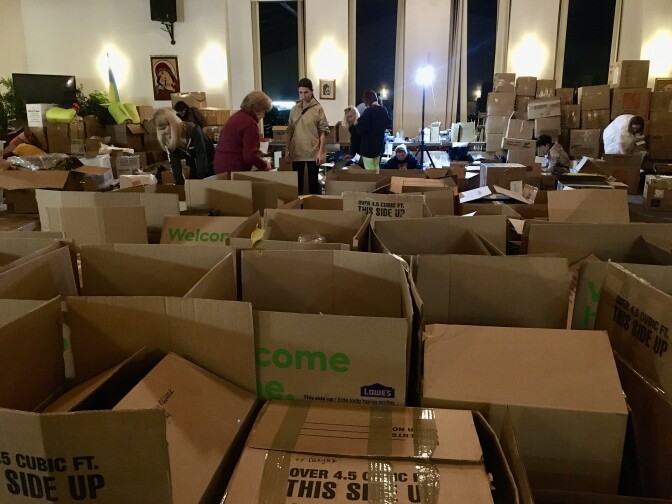This story is free to read because readers choose to support LAist. If you find value in independent local reporting, make a donation to power our newsroom today.
When Your Friend Believes Russia's Lies. How LA's Ukrainians And Russians Are Dealing With Fear And Disinformation

One recent night at the St. Andrew Ukrainian Orthodox Church in Echo Park, as volunteers packed boxes of emergency supplies to send to Ukraine, Dmytro Gorbanov worried about his family.
His parents, sister and other family live in eastern Ukraine, amid the heaviest fighting. He’d last had contact with them about 12 hours earlier.
“They said there are air strikes, ground strikes, everything, and they are just sitting in a shelter, without food, without anything,” said Gorbanov, who welcomed the volunteer work as a distraction from worrying.
But when Gorbanov tried to talk about the war with a close childhood friend in Russia, he said it was as if his friend were living in an alternate reality. His friend has tried to tell him Ukraine is the aggressor, a lie perpetrated by the Russian government.
“He is saying, ‘Oh, I hope this will end soon, and we will just forget about it.’ And it’s like, how can I forget if you’re killing our people right now?” said Gorbanov, who lives in downtown L.A. with his wife, also from an embattled part of eastern Ukraine.
“I’m even not sure if he is my friend now,” he continued. “I cannot forgive what he is saying, that we can just forget about it … he doesn’t realize what’s going on right now in Ukraine.”
The exchange Gorbanov had has become sadly commonplace. Southern California’s Ukrainians and Russians share close cultural ties, and many have relatives and friends in both countries. With Russia’s invasion of Ukraine, people are worried their loved ones will be killed while the Kremlin’s disinformation campaign is driving a wedge between them and family in Russia.

‘She Just Still Believes The Propaganda’
Anastasia Shostak and her husband Daniel live in Koreatown. Both were born in Russia. They also have family in Ukraine.
“The whole situation with Ukraine over these years has been really divisive for my family, but now, it’s just escalated,” said Anastasia, who came to the U.S. in 2016 and now works for the Jewish Federation of Greater Los Angeles.
Anastasia has been in regular contact with her family. Almost every day she checks in with a cousin in eastern Ukraine who tried to leave but was unable to.
“There were road blockages, and it became very quickly, very dangerous to drive,” Anastasia said. “They had to stay in that town, that’s been bombed almost every day.”
She also checks in regularly with her grandmother, who lives a few hours’ drive from Moscow — and who has heard the same terrifying stories from Anastasia’s cousin.

“This is my grandma's niece … the weirdest thing is that they’ve spoken over the phone multiple times since the war began,” Anastasia said. “So my grandma knows exactly what's going on and she gets this information firsthand from her relative.”
However, “she just still believes the [Russian] propaganda,” she said. “That's also something I cannot process.”
Anastasia said her grandmother is a staunch supporter of Russian President Vladimir Putin and follows Russian state media, which is spreading Moscow’s false narratives about the invasion. “She watches Russian TV every day, all day,” she said.
‘I’m Not Gonna Be Killing People’
Daniel Shostak has been trying to convince his younger brother — who is of military draft age — that he could eventually be sent to fight in Ukraine. He said his brother doesn’t buy the Russian propaganda surrounding the war, but there’s still a disconnect.
“He thinks it's not going to involve him,” he said. “He thinks he won't be affected by it. And I'm convinced that he is wrong on this account and that he is at risk of being very much involved.”
Daniel and Anastasia have tried to convince his brother to leave the country, like many Russians already have, as rumors swirl about impending martial law and the economy reels from international sanctions. So far, the couple have had no luck persuading him.
But other family members have needed no persuading. About a week ago, Anastasia’s parents made the decision to leave Russia, along with her two young sisters.
Her parents disagreed with the war. And as a military reservist, her father was potentially at risk.
“Even though he’s 50, he would still be among the people to be drafted,” she said. “My mom said, ‘I don't want my husband to go on the front line and die.’ And my dad … texted me: ‘Whatever happens, I just want you to know that I'm not gonna be killing people. ‘”
Russia’s tanking economy and Putin’s crackdown on civil society also fueled their decision.
Anastasia’s father left first, and has since made it to Israel. The family is Jewish; her mother and sisters planned to join him.
As for Anastasia’s grandmother, “her heart is broken” by her son’s decision to leave Russia, Anastasia said. But with the way Russia is spinning events, she said, it’s been difficult for her grandmother to understand how dire things are becoming.
“Because this is how things have been communicated by the Russian propaganda, like it’s no big deal,” Anastasia said. “The sanctions are not a big deal, even with all of these international companies leaving the Russian market … she watches the TV, and the TV says everything is okay.”







